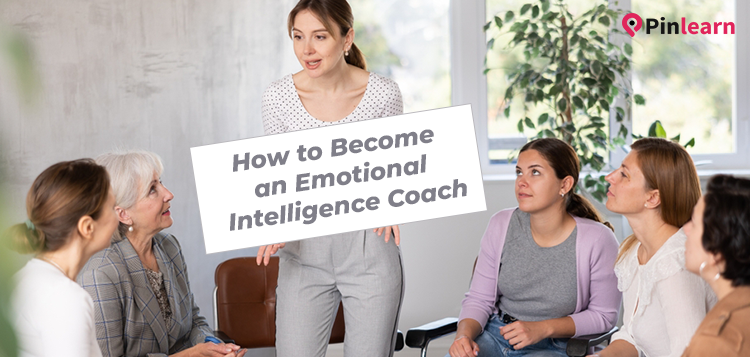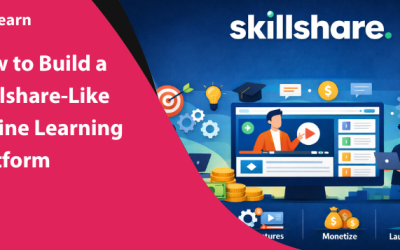How to Become an Emotional Intelligence Coach: A Complete Guide
Emotional intelligence is a must-have skill in all spheres of life. Be it corporate success, leadership, or even managing interpersonal relationships. In fact, many believe that EQ is more important than IQ for success in life!
Well, the good news is that you can gain emotional intelligence with practice and feedback from an emotional intelligence expert. With emotional intelligence being the new black, becoming an emotional intelligence coach is a lucrative niche to explore!
Whether you’re an aspiring EI coach or a seasoned consultant, this blog will guide you on how to become an emotional intelligence coach. This blog covers the essentials, detailed steps to becoming an emotional coach, and some practical insights from top EI coaches.
So, are you ready to empower others in their emotional journey?
What is Emotional Intelligence Coaching?
Before delving deeper into the details of emotional intelligence coaching, let’s first understand the basics. Emotional intelligence is the ability to develop awareness of one’s emotions, understand how they affect others and manage them successfully.
There are four components of emotional intelligence: self-awareness, self-management, social awareness and relationship management.
What is emotional intelligence coaching? Emotional intelligence coaching involves determining the EQ goals and creating an actionable plan to achieve them. Simply put, emotional intelligence is strategizing to improve your emotional quotient.
What Does an Emotional Intelligence Coach Do?
Emotional Intelligence Coaches play a multi-faceted role in helping clients in their personal and professional growth.
Typically, an EI coach guides you to improve your emotional quotient skills through effective behavioral changes. Their areas of expertise include self-regulation, emotional awareness, empathy, social skills, motivation, etc.
So, what does a typical day as an emotional intelligence coach look like?
Emotional intelligence coaches help to build resilience with the help of the following tasks:
- Helping clients to understand their current behavior, beliefs, motives, attitudes, responses, etc.
- Identifying long-term and short-term goals and finding the likely motivators.
- Creating a clear, actionable plan to attain the goals.
- Helping to change unhealthy emotional habits obstructing success.
- Guiding to navigate through challenges and difficult situations.
Steps to Become an Emotional Intelligence Coach
So, you know to grasp others emotions well and can help them navigate through challenging situations. Then, becoming an emotional intelligence coach might be your dream career!
If you’re not certain where to begin with, here’s a clear roadmap on how to become an emotional intelligence coach:
Step 1: Deepen Your Knowledge of Emotional Intelligence
You might have decided to become an emotional intelligence coach, given your innate passion for helping others build resilience. However, emotional intelligence is an extensive subject and a sensitive field of coaching that requires some background to begin with!
For example, you could start mastering Daniel Goleman’s foundational emotional theory, which outlines the five key aspects of EI (self-awareness, self-regulation, motivation, empathy, and social skills). You can also learn other frameworks and models of emotional intelligence, such as Bar-On’s EI competency model and the Mayer-Salovey-Caruso model.
Step 2: Choose a Niche
Next, you need to choose a specific niche to stand out!
Because, promoting yourself with a generic statement like “I am an EI coach” is not enough.
There might be several such EI coaches out there. How do you stand a chance among them?
Target a specific audience group or a particular emotional realm, such as high-level executives, teenage students, entrepreneurs, or married women.
Discover a relevant problem in your niche. This could be as simple as helping teenage students deal effectively with bullying.
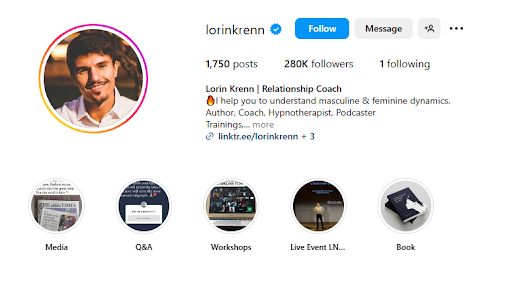
Here are a few possible niches for EI coaching:
- Business and Entrepreneurship
- Relationships and dating
- Career Advancements and Transitions
- Personal development and growth
- Leadership
- Early childhood or teen development
Tapping into the right niche ensures the long-term success of building your coaching business.
Lastly, validate whether your niche is profitable enough!
🤔💭Struggling to find your niche? Read our blog on “15 Top profitable life coaching niches.”
Step 3: Get Essential Education and Certifications
Now, let’s spill some beans on certifications.
While certification is not mandatory, it gives the foundation for becoming an emotional coach! A bachelor’s degree in counseling, psychology, education or human resources is helpful.
Here are a few relevant EI coaching certifications:
-
The Emotional Intelligence Training Company (EQ-i 2.0 / EQ 360 Certified)
The EQ-i 2.0 / EQ 360 Certification is a leading certification program covering 15 emotional intelligence competencies for highly effective leadership and performing teams.
Course Length: Four half-day training sessions
Cost: $1,697
Accreditation: ICF-accredited
-
Daniel Goleman Emotional Intelligence Coaching Certification
The Daniel Goleman Emotional Intelligence Coaching Certification is a flagship training program covering foundational and transformational concepts of emotional intelligence.
Course Length: 12-week
Cost: $1,045
Accreditation: Not accredited
-
EQ Coach Certification by SixSeconds
The EQ Coach Certification is a transformational coaching program covering emotional intelligence concepts and ICF competencies.
Course Length: 220 instructional hours
Cost: $10,000
Accreditation: ICF-accredited
Note: Ultimately, it’s not the certifications but the results you deliver based on your experience! Don’t limit your experiences and creativity to certification. Evolve with practical experience, interests and passion over time.
Step 4: Practice Coaching and Gain Experience
Once certified, you have mastered the basic skills and foundational concepts to start as an emotional coach. But, you also need practical insights and expertise to traverse through the arduous coaching realm!
You can improve your coaching skills and learn new strategies by offering actual coaching services. Start with free or low-cost coaching sessions in your chosen niche. This would offer you enough confidence and testimonials to transition to full-time coaching!
You can gain practical experience by offering coaching at the following places:
- Taking up internships or volunteering at community centers or non-profit organizations.
- Providing a free workshop or hosting webinars on sensitive topics like bullying, stress-coping mechanisms or the significance of emotional intelligence.
- Offer training or seminars in corporate settings to improve workplace ethics.
- Enroll with practical coaching certification programs or certifications.
- Look for opportunities to work with other professionals in your niche, like therapists, consultants, trainers, etc.
Remember, building a successful coaching practice is an ongoing process. Hence, focus on offering value to your clients and discovering your coaching style along the way. Your growth and revenue would follow eventually📈!
Step 5: Craft Your First Coaching Offer
You have gathered enough real-world coaching experience; now it’s time to create your coaching program. This makes your signature coaching package!
Every coach has a unique coaching style for dealing with their clients! Your coaching offer is a sum of your expected coaching outcome, methodologies, techniques and tools.
Start with defining a concise and attainable coaching outcome for your coaching program. For example, Nadiya Manji’s “Rewire your business program” has a clear outcome: “Effective and productive to transform your dream business.”
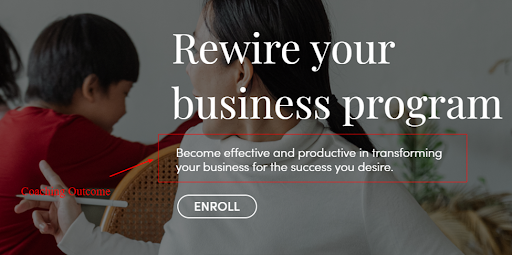
Which tools and techniques would help your clients achieve outcomes? What kind of exercises would help your clients in between the sessions? Include worksheets, guided meditations, journal prompts, and assessments within your coaching program.
For example, you can start assessing your clients’ EQ with self-assessment, skill tests or peer reports. The most commonly used tests are EQ-i2.0(Emotional Quotient Inventory), 360-degree assessment, M.S.C.E.I.T or DISC profile.
Speaking about coaching methods, G.R.O.W., ETC self-coaching, and the four-branch model are a few popular coaching models. Determine whether you’re offering 1:1 coaching or group coaching sessions or both. Next, decide the frequency and length of your coaching program. You can offer weekly, bi-weekly, or at your convenience.
Step 6: Decide the Right Price Point
Pricing is an essential aspect of your coaching program. Of course, you can’t price your coaching offer too low or too high. Find a sweet spot based on your value, target audience, and location. When dealing with high-profile clients, you can decide your prices based on your results or ROI from your offer.
Hourly rates, monthly rates, and packages are the three commonly used pricing models for coaching.
Both hourly and retainer packages are typically not recommended for coaching. Package pricing is a win-win for clients and coaches.
For example, you can create a 3-month signature package with 12 to 20 calls for $1,500. Clients get enough time to notice results, and coaches get a fixed revenue.
Further, you can create multiple packages with different outcomes and pricing that cater to different budgets and preferences.
Step 7: Create Your Personal Brand
“Your brand is what people say about you when you’re not in the room.”
- Jeff Bezos
With intense competition in the coaching industry, personal branding is more important than ever. And building your personal brand could be a game-changer for your coaching business.
The first thing that comes to our mind when we hear “personal brand” are logos, colors and fonts. But a personal brand extends beyond aesthetics; it is about your unique business proposition! Your USP amalgamates everything you do as a coach!
Here are the key branding aspects to build your coaching business:
- A clear niche
- Unique Business Proposition
- Testimonials & Case Studies
- Consistent Visual Identity(Logos, Font, Brand Colors, Imagery)
- Communication Style & Tone
- Appealing content
A compelling brand story attracts the right audience to your coaching business. So, make sure your personal brand aligns with your business goals and reflects your beliefs, values and principles.
Consider Tiffany E. Gibson, a popular emotional intelligence coach who helps nurses develop self-awareness.
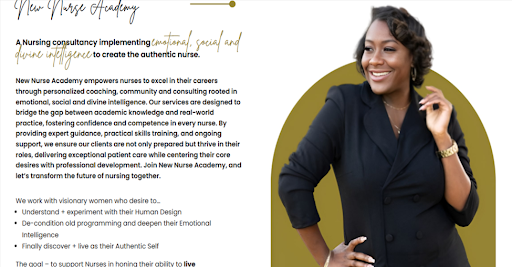
Now, let’s take a look at her social media profile!
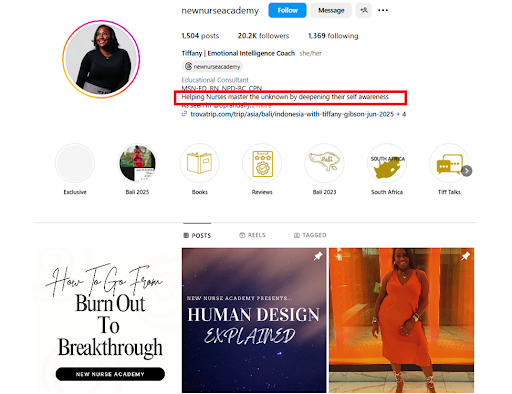
Step 8: Establish Your Coaching Practice
Now that you have created your coaching offer and your personal brand, it’s time to set up your coaching practice. A clear strategy helps you roll out your business seamlessly without hassles.
These are essential aspects of establishing your coaching practice:
- Choose a suitable business name and relevant structure (e.g., sole entrepreneurship, Limited Liability corporation, partnership, etc. ).
- Create a coaching contract that includes client-coach details, coaching goals, refund policy, payment schedule, disclaimers, etc.
- Design a professional website promoting your coaching services with testimonials and case studies. Invest in the tools, CRM, scheduling software, email marketing and analytics software to run your business smoothly.
💁♂️ Pro Tip: Integrate the power of Pinlearn into your coaching business. It is an all-in-one coaching software that helps to manage with a single software. From live coaching sessions and comprehensive analytics to convenient payment gateways, Pinlearn is a one-stop destination to level up your coaching game!
Step 9: Promote Your Services and Attract Clients
Marketing your coaching services is crucial for spreading the word and persuading the right clients! Do some research and identify the channels where your ideal clients hang out!
Leverage these practical strategies to elevate your marketing game:
- Use your network of family and friends and inform them about your coaching.
- Share tips, relevant information, myth-busters, and testimonials on social media platforms.
- Contact your local professional network of therapists, health professionals, schools, and community centers.
- Create blog posts and articles on trending niche topics like “dealing with workplace conflicts” or “how to be a leader.”
- Optimize your professional website for relevant niche keywords.
- Interview on popular podcast channels in your niche. Talk about trending topics and subtly promote your coaching business.
- Build your network with events and conferences and reach out to other coaches.
Step 10: Stay Updated & Evolve Your Coaching Practice
Learning is a constant quest and requires constant effort and dedication. As a coach, it’s necessary to adopt a growth mindset!
The world is evolving rapidly, and it is necessary to keep your coaching attuned to these developments. When you feel down or need some inspiration, you can read a coaching book. You can also keep up-to-date with new research and breakthroughs in the field of emotional intelligence. If you are feeling stuck or overwhelmed with how to move forward, hire a new coach in your wing!
Becoming an emotional intelligence coach can make you feel like you are traversing a lonely path. Network. Gain practical insights and access to key resources from those who have traversed a similar path.
Experiment and explore new learning opportunities. Seek out new ways to scale and grow your coaching business!
What are the Skills and Traits to Become an Emotional Intelligence Coach?
You’re well acquainted with the steps to become an emotional intelligence coach. But do you possess the essential skills for becoming an emotional intelligence coach?
Let’s find out!
These are key skills to become a great emotional intelligence coach:
-
Self-Awareness
As a coach, your interactions, values, and beliefs influence your clients. Being more aware of your words, emotions, and actions helps you guide your clients better.
-
Empathy
Empathy is a highly valued skill for creating a safe and conducive coaching environment for your clients. It helps coaches understand clients’ feelings, situations, and expectations and personalize their coaching approach accordingly.
-
Problem-Solving
As an emotional intelligence coach, clients facing unique challenges seek your support. From emotional outbursts to leadership advice, EI coaches must have a clear mind and problem-solving approach to address these problems.
-
Excellent Communication Skills
Great coaches endorse a concise and transparent communication style, along with being attuned to clients’ feedback. Be clear about your coaching outcomes and set appropriate goals early in your coaching process.
-
Active Listening Skills
Now, this is an irreplaceable skill that coaches can’t do without! Listen clearly to what your clients are saying, how they say it, and even their nonverbal actions. Go that extra mile to listen beyond words and imagine yourself in their situation to understand their side of the story.
-
Ability Emotional Regulation
Your mental and emotional health also matters as a coach. To be a better coach, you need to know how to regulate your emotions and balance your personal and professional arenas. Set clear boundaries and follow a proper daily schedule to avoid burnout.
How Much Do Emotional Intelligence Coaches Make?
Considering the number of people seeking emotional help, emotional intelligence is definitely a demanding career. In fact, the emotional intelligence market industry is projected to grow from $5.82 billion to $12.1 billion from 2023 to 2032.
According to ZipRecruiter, an EI Coach in the United States earns around $48,790 annually.
However, this is a rough estimate. Coaches can earn even more or less depending on their location, experience, certification, or coaching services. For a better idea, look into the earnings of similar coaches in your niche.
Top Emotional Intelligence Coaches
Now, let’s gain practical insights from popular coaches who have built empires in this domain.
-
Daniel Goleman
Daniel Goleman is a revolutionary emotional intelligence coach and author of the groundbreaking book ” Emotional Intelligence: Why It Can Matter More Than IQ.” His transformational 1995 book was a New York best-seller. It has been translated into over 40 languages.
The book has transformed how human behavior and relationships play a key role in workplace and leadership roles. His body of work in EI primarily deals with self-awareness, self-regulation, motivation, empathy, and social skills.
Daniel Goleman is a multi-hyphenate and plays different roles, from a psychologist to best-selling author and science journalist. Moreover, Goleman has won several accolades from the American Psychological Association and American Association of Advancement in Science and also holds a place in the Thinkers50 list.
He has been ranked among the top 10 influential business thinkers in the Wall Street Journal and is a frequent TED speaker for top brands.
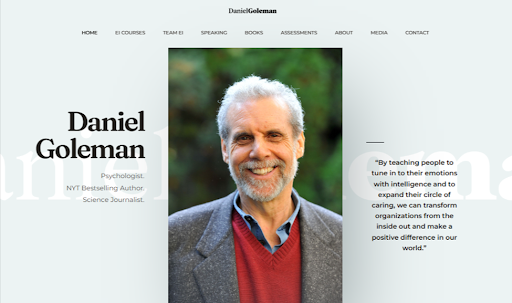
-
Grant Hebert
With over 37 years of experience in leadership training and coaching, Grant Hebert is a well-known figure in emotional intelligence coaching. He is an internationally known speaker and trainer who has been named “Emotional Intelligence Speaker of the Year” for two consecutive years.
His expertise includes leadership development, self-awareness, interpersonal skills, and resilience. Hebert frequently conducts workshops and training sessions and discusses leadership and personal growth and development.
PWC, KPMG, Thomas Reuters, and Western Sydney University are among Hebert’s top clients. He also owns popular training companies, such as People Builders, Emotional Intelligence Academy, and Professional Services Leadership Academy.
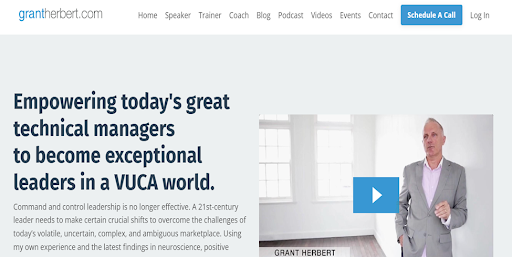
Conclusion
Now, it’s over to you! You have gained much knowledge on how to become an emotional intelligence coach! Emotional intelligence coaching is an immensely empowering field in which you guide people towards emotional well-being.
However, becoming an EI coach demands a strong skillset, knowledge of emotional intelligence and a strong coaching offer! We hope this detailed guide has helped you gain practical insights and a clear roadmap to start your coaching journey!
So, are you ready to stride through this transformative journey?
FAQ-Related to How to Become an Emotional Intelligence Coach
1. What is an emotional intelligence coach?
An emotional intelligence coach helps individuals understand, manage and improve their emotions for overall personal and professional growth.
2. How to become an emotional intelligence coach?
To become an emotional intelligence coach, gain a relevant and accredited certification in your niche and ensure you have the required background. Research and learn the basics of emotional intelligence, specialize in a niche, practice coaching through internships or workshops, create your coaching offer and attract clients to your business.
3. Is emotional intelligence coaching in demand?
Yes, emotional intelligence coaching is definitely a demanding field. Many people seek support to build emotional resilience in different aspects of life, such as relationships, career advancements, or even personal fulfillment. Moreover, the emotional intelligence market industry is expected to reach $12.1 billion by 2032 from $5.82 billion.
4. How much does emotional coaching certification cost?
Emotional coaching certifications vary from $500 to $13,000 depending on the course type, accreditation and curriculum. The Daniel Goleman Emotional Intelligence Coaching Certification, EQ-i 2.0 / EQ 360 certifications, and EQ Coach Certification by SixSeconds are few popular EQ certifications.

